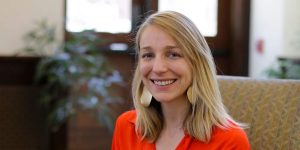by Tyler Easterbrook, Digital Humanities Specialist
English PhD candidate Sarah George-Waterfield is blending traditional scholarship with artistic practice in her alternative dissertation project, which examines how contemporary multi-ethnic writers depict fabric and textiles in their work. Under the directorship of Professor Jennifer Ho, Sarah designed an interactive art installation, Text and Textile, that weaves together—literally and figuratively—fabric and narrative. Sarah debuted this installation on March 30th at The Culture Mill Lab in Saxapahaw, NC.
Text and Textile guides participants through three interconnected rooms based on literary works by multi-ethnic writers: Ntozake Shange’s 1982 novel Sassafrass, Cypress & Indigo; Jean Kwok’s 2011 novel Girl in Translation; and Daisy Hernández’s 2014 memoir A Cup of Water Under by Bed. Constructed entirely from reused materials like scraps of fabric from discarded clothes, Text and Textile challenges participants to consider the interrelationships of memory, fabric, and storytelling. The installation provides attendees with a multisensory experience as they move through the exhibits. Participants can listen to the hum of a sewing machine, read excerpts of text woven into fabrics, and feel the textures of garments stitched together from scraps. In Sarah’s words, these experiences prompt her audience to consider “the unseen labor behind both text and textiles” and this labor’s relationship to constructions of women’s work globally.
Reflecting on her research process, Sarah describes how pursuing an alternative dissertation allowed her to develop unique skills and to reconceive what research could do. “Doing an alternative dissertation gave me some leeway to experiment with and develop skills that I hope to be able to use in another professional sphere,” Sarah notes, such as “project planning and management, crafting robust editorial calendars, website design and management, [and] arts outreach and education.” In addition to the skills she developed, Sarah believes that her research into textiles, narrative, and memory could not have been adequately conveyed by a traditional academic text. “[T]he subject matter itself demanded something other than a monograph. I was generating a project around stories and characters that were interested in alternative means of knowledge production as I was myself attempting to produce knowledge by other means.”
For others interested in alternative dissertations, Sarah recommends building a strong support network above all. “My advice is very simple: Surround yourself with interested supportive people and mentors. Document everything—you never know what will be useful. Become really good at asking for help because if you’re stretching yourself with a project outside of your field or discipline or wheelhouse, it can be really scary and lonely, but people want to help and be involved.”
To learn more about Sarah and her alternative dissertation project, visit her blog at https://fabricthinking.wordpress.com/.


